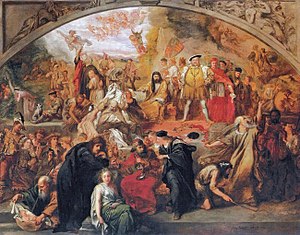 |
| Image via Wikipedia |
How
do you go about reviewing a work that must have been described, analysed and
generally pulled apart by thousands of readers, writers, scholars and
professional reviewers? Well, as I see it, the only thing to do is give a very personal
opinion.
Shakespeare
is, of course, our national bard, our cultural hero, if we write in English.
So, the reviewer better beware if he says anything untoward. But I set myself a
target and I'm determined to hit it. The target? As a writer, to read and
review at least 52 books this year, all taken from my 'to read' list'. So, you
have my motivation.
I
have yet to read most of the Bard's work. What I've so far managed has been
very good. But I can't say that for All's Well That Ends Well. It reads like an
apprentice piece, almost as if it was written by a different author, in fact.
In
common with much of his work, Shakespeare took the original plot from
Boccaccio's Decameron and embellished it with his own characters and additions.
But, for me, he hasn't done his usual magic here. I found much of the text
tedious. There was little that made me laugh and a great deal that felt like
unnecessary complication. In fact, the play, for me, would have worked much
better without a number of the scenes; some of which seemed to have no bearing on
the story at all.
Of
course, the language is brilliant most of the time, of course the characters
are written with the usual sureness of style and genius. But the whole doesn't
quite add up to the parts in this one. Naturally, there is the ever present
problem for a modern reader that certain references no longer have the meaning
they did for the contemporary audience and this means that some of the jokes
fall flat. Some of the words used have not been included in the staggering
total of new words that Will added to our language and context is then the only
clue to their meaning.
I
was able to follow the story, the plot, relatively easily. But some of the
characters failed to display the qualities they were reported to carry by their
fellows. So, I could see no evidence, until the scene where he is hooded and
tricked, of Parolles' reported wickedness. He came across as no more a villain
than others in the play. Even his diatribe against Lafeu seemed relatively
justified in light of the Old Lord's treatment of him. And it was difficult to
understand Helena's infatuation for the superficial, opportunist and selfish
Bertram.
So,
not a play I'm likely to go out of my way to watch, though it's my personal
experience that Shakespeare always comes alive when performed, especially by a
good ensemble cast. I'm sorry if I've offended or upset the lovers of our
national poet, amongst which I count myself, but this one was a disappointment.

No comments:
Post a Comment